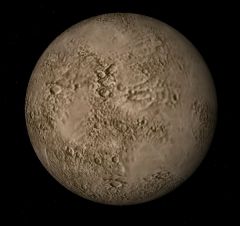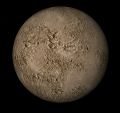Prospero
Prospero (Uranus XVIII, S/1999 U 3) a retrograde irregular moons of Uranus. It was discovered by Matthew J Holman et al on 18 July 1999. It is named for the sorcerer William Shakespeare's The Tempest.
Prospero in Orbiter
Prospero was released in the add-on uranus-neptune_ii.zip in March 2003.
| Add-on | Source | Version | Author | Type | Release Date | Compatibility | Wiki article |
|---|---|---|---|---|---|---|---|
| Uranus-Neptune II | AVSIM | Rolf B Keibel | Scenery | 6 March 2003 | |||
Discovery image of Prospero by the Canada-France-Hawaii Telescope
| Uranus's natural satellites |
|---|
| Named Satellites:
Ariel | Belinda | Bianca | Caliban | Cordelia | Cressida | Cupid | Desdemona | Ferdinand | Francisco | Juliet | Mab | Margaret | Miranda | Oberon | Ophelia | Perdita | Portia | Prospero | Puck | Rosalind | Setebos | Stephano | Sycorax | Titania | Trinculo | Umbriel Numbered Satellites: |
| See also: Pronunciation key | rings of Uranus |
| edit The Solar System | |
|---|---|
| Central star |
Sun (Sol) |
| Planets |
Mercury - Venus - Earth - Mars - Jupiter - Saturn - Uranus - Neptune |
| Natural satellites |
Moon - Phobos - Deimos - Io - Europa - Ganymede - Titan - more... |
| Add-ons |
Planets - Dwarf Planets - Small objects - Natural satellites - Alternative star systems |
 | This natural satellite related article is a stub. You can help Orbiterwiki by expanding it.
|


